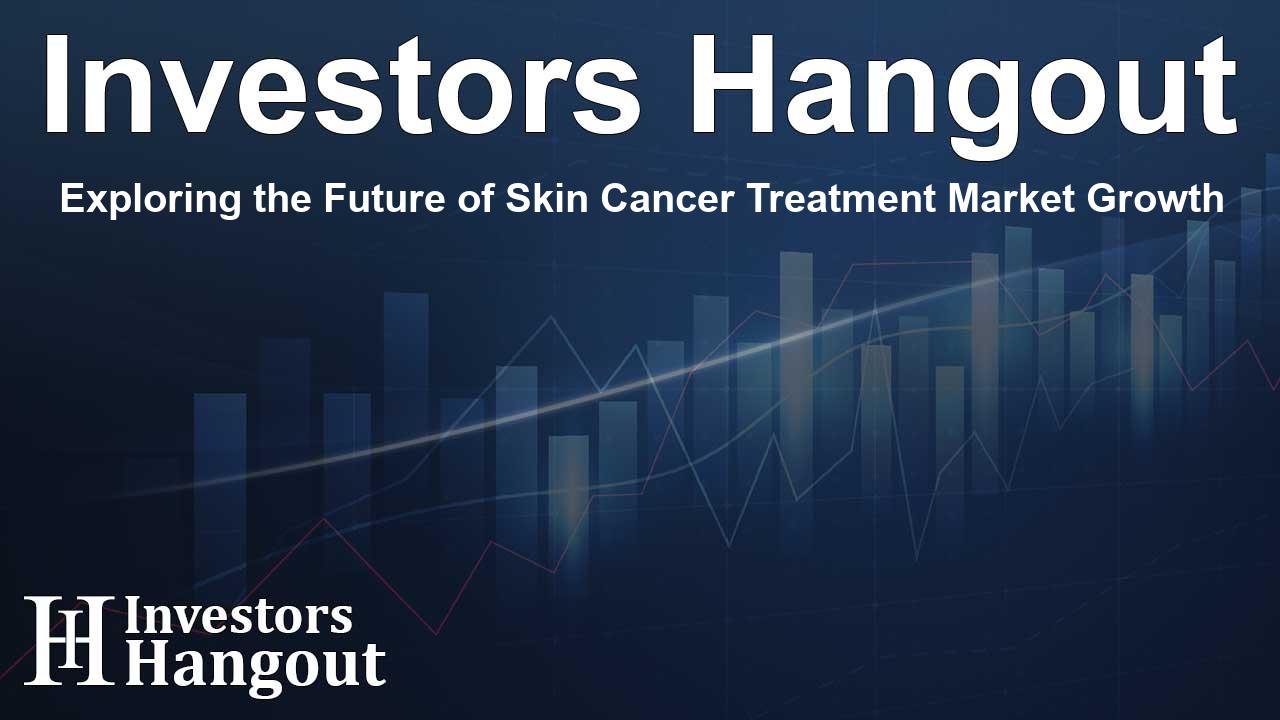Exploring the Future of Skin Cancer Treatment Market Growth

Overview of the Skin Cancer Treatment Market
The skin cancer treatment market is witnessing substantial growth, fueled by several factors including the rise in melanoma cases and advancements in treatment methodologies. Recent reports reveal that the market was valued at approximately USD 10.87 billion in recent years and is set to reach an astounding USD 19.27 billion shortly thereafter, driven by a compound annual growth rate (CAGR) of 7.42% from the mid-2020s into the early 2030s. This remarkable growth can be attributed to a combination of factors ranging from heightened awareness of skin cancers to the availability of innovative treatments.
Current State and Demand Drivers
The rising incidence of both melanoma and non-melanoma skin cancers is a significant driver for market expansion. With increasing exposure to ultraviolet (UV) radiation and an aging population, more individuals are diagnosed with skin cancer. Furthermore, advancements in immunotherapy, the development of targeted therapies, and improved early diagnostic tools contribute to enhanced treatment responses. These factors are complemented by governmental screening programs and growing investments into oncology research and development, especially in regions that are keen to enhance their healthcare frameworks.
Market Composition and Segmentation
The skin cancer treatment market is categorized by various parameters, including cancer type, therapy type, and the route of drug administration.
Melanoma as the Dominant Segment
Melanoma represents a critical segment within the skin cancer treatment market, primarily due to its aggressive nature and increasing global incidence rate. Melanoma typically requires more complex treatments than its non-melanoma counterparts and has been associated with higher treatment costs. This scenario is reinforcing the adoption of advanced immunotherapeutic modalities and checkpoint inhibitors, which have shown significant effectiveness in managing melanoma cases.
Regional Insights
North America currently holds the largest share of the skin cancer treatment market, contributing significantly due to high prevalence rates and the existence of a robust healthcare system. The United States plays a pivotal role in driving demand, boasting significant investments in clinical trials and the prevalence of advanced therapies like immunotherapy and targeted treatments. In contrast, the Asia-Pacific region is expected to experience the fastest growth, driven by escalating urban populations facing increased UV exposure and improvements in healthcare infrastructure. Countries such as China and India are making notable investments in oncology care, thereby enhancing access to dermatological services.
Understanding Routes of Administration
The route of administration for skin cancer therapies varies widely, with a notable preference for topical treatments. Topical medications, including imiquimod and 5-fluorouracil, are particularly favored due to their non-invasive nature and accessibility, making them a go-to choice for treating early-stage skin cancers.
Innovations in the Skin Cancer Treatment Landscape
As the market evolves, innovative strategies and unique selling propositions are emerging to help healthcare providers better understand and tackle skin cancer treatment pathways. Reports emphasizing biomarker-driven patient stratification offer insights into identifying lucrative patient demographics and revenue opportunities. Leveraging real-world evidence allows for informed decision-making that enhances treatment efficacy while justifying costs to payers and providers alike.
Key Industry Players
The competitive landscape of the skin cancer treatment market is shaped by several prominent companies spanning the pharmaceutical sector. Key players include Roche Holding AG, Merck & Co. Inc., and Bristol-Myers Squibb Company among others. These organizations are at the forefront of developing innovative treatment protocols that aim to enhance patient outcomes and streamline healthcare experiences.
Looking Forward
As we look to the future, the skin cancer treatment market demonstrates significant promise with continuing advancements in research and therapeutics. This forward momentum is expected to drive market demand as awareness and diagnosis efforts propel more individuals toward seeking timely treatment. Collaborative efforts among stakeholders, including government institutions, healthcare providers, and pharmaceutical companies, will be essential in propelling the growth of the skin cancer treatment market into the next decade.
Frequently Asked Questions
1. What factors are driving the growth of the skin cancer treatment market?
The growth is primarily driven by increasing melanoma incidence, awareness of treatment options, governmental screening programs, and advancements in immunotherapy.
2. Which therapies are leading the skin cancer treatment market?
Immunotherapy, targeted therapies, and topical treatments are currently at the forefront of the skin cancer treatment market.
3. How is the North American market influencing global trends?
North America leads in market share due to its advanced healthcare systems, high incidences of skin cancers, and significant investments in clinical treatments.
4. What is the expected CAGR for the market?
The skin cancer treatment market is projected to experience a CAGR of 7.42% from the mid-2020s to early 2030s.
5. How are companies strategically positioning themselves in this market?
Companies are focusing on innovation in treatments, leveraging real-world evidence for market insights, and better patient stratification to optimize outcomes.
About The Author
Contact Lucas Young privately here. Or send an email with ATTN: Lucas Young as the subject to contact@investorshangout.com.
About Investors Hangout
Investors Hangout is a leading online stock forum for financial discussion and learning, offering a wide range of free tools and resources. It draws in traders of all levels, who exchange market knowledge, investigate trading tactics, and keep an eye on industry developments in real time. Featuring financial articles, stock message boards, quotes, charts, company profiles, and live news updates. Through cooperative learning and a wealth of informational resources, it helps users from novices creating their first portfolios to experts honing their techniques. Join Investors Hangout today: https://investorshangout.com/
The content of this article is based on factual, publicly available information and does not represent legal, financial, or investment advice. Investors Hangout does not offer financial advice, and the author is not a licensed financial advisor. Consult a qualified advisor before making any financial or investment decisions based on this article. This article should not be considered advice to purchase, sell, or hold any securities or other investments. If any of the material provided here is inaccurate, please contact us for corrections.
